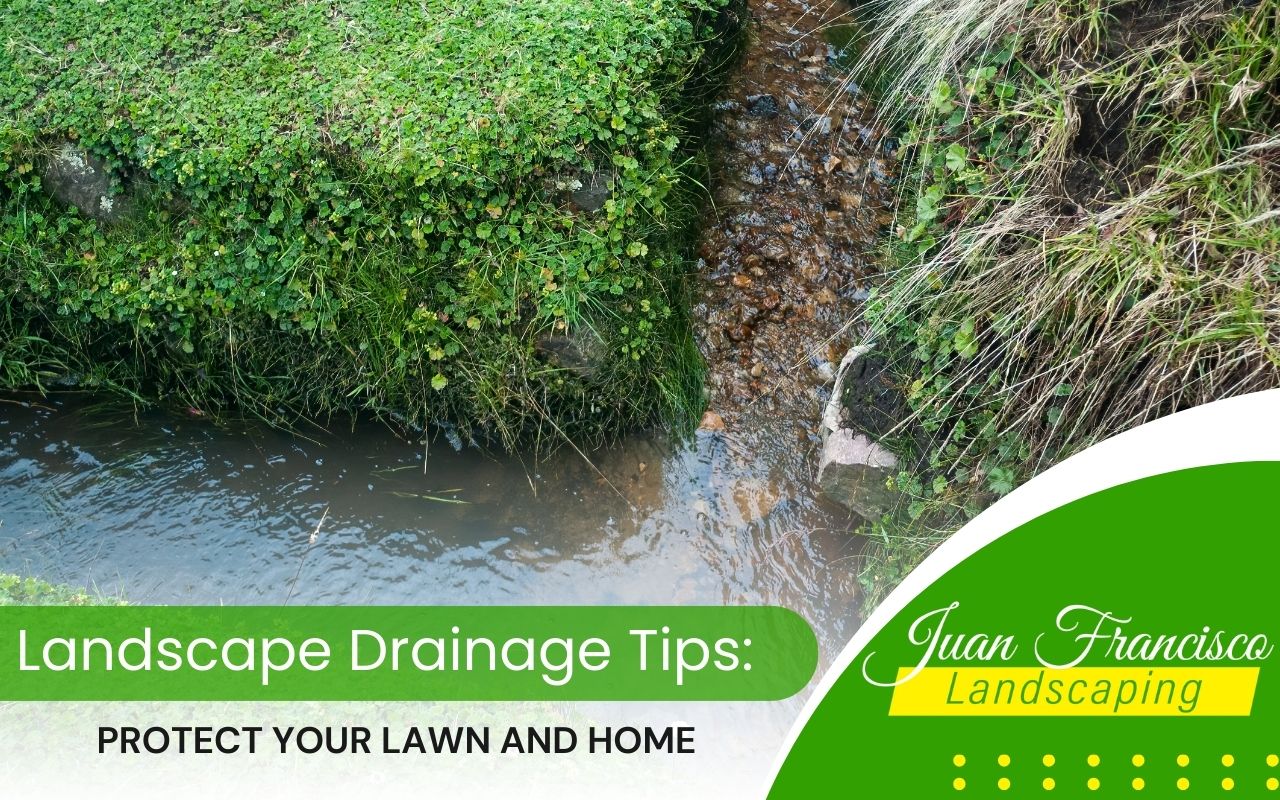
Landscape Drainage Tips: Protect Your Lawn and Home
Proper landscape drainage is essential to maintaining a healthy, lush lawn and protecting your property from water damage. Landscape drainage tips can help prevent common water issues like flooding, soggy patches, and erosion in your yard. In Knoxville, where heavy rains and clay soil are common, implementing the right drainage solutions can make all the difference in the health of your lawn and the longevity of your home.
Effective Landscape Drainage Solutions
How to Prevent Water Damage in Your Yard
Standing water on your lawn can create various problems, including soil erosion, plant damage, and foundation issues. The key to preventing water damage is managing runoff effectively. Here are a few landscape drainage tips to protect your property:
- Install French Drains: French drains are an effective way to direct water away from your lawn. By digging a trench and filling it with gravel and a perforated pipe, you can redirect excess water to a safer area.
- Use Rain Gutters and Downspouts: Properly installed gutters and downspouts can prevent water from pooling near your home’s foundation. Ensure that downspouts extend at least three feet away from the building to keep water from draining toward the foundation.
- Create Swales for Water Redirection: Swales are shallow ditches that can redirect water to areas where it can safely flow away from your home. By installing swales along the perimeter of your yard, you can ensure that water doesn’t accumulate in undesirable areas.
Landscape Drainage Tips for Improving Lawn Health
How to Improve Lawn Drainage Naturally
Your lawn’s drainage system must allow water to move freely and reach the roots. Your grass will suffer if the water doesn’t properly filter through the soil. Here are some tips to help improve your lawn’s drainage naturally:
- Aerate Your Lawn: Lawn aeration creates holes in the soil, allowing water and nutrients to penetrate deeper. This technique helps alleviate compaction and promotes healthy root growth, ensuring your grass remains strong and vibrant.
- Amend Your Soil with Organic Matter: Adding compost or organic material improves the structure of your soil, making it more porous and better able to absorb water. This helps prevent surface runoff and reduces the risk of flooding.
- Plant Native Plants: Native plants are naturally adapted to the local environment, including Knoxville’s drainage patterns. Their deep roots help break up compacted soil and improve water flow, making them an excellent addition to any drainage strategy.
Eco-Friendly Landscape Drainage Tips
Sustainable Solutions for Lawn and Yard Care
When managing your landscape drainage, it’s important to consider eco-friendly practices that benefit your lawn and the environment. Here are a few tips to keep your yard green and sustainable:
- Rainwater Harvesting: Installing a rainwater harvesting system allows you to collect runoff and use it for irrigation. This reduces water waste and conserves valuable resources.
- Create a Rain Garden: Rain gardens are designed to capture and filter excess water from your yard. By planting native plants and using mulch, you can create a garden that naturally absorbs and drains rainwater.
- Use Gravel and Permeable Paving: Instead of traditional pavement or concrete, consider using permeable materials like gravel or pavers that allow water to drain. These materials reduce runoff and promote water absorption into the soil.
Prevent Future Drainage Problems with Landscape Maintenance
Regular Lawn Care to Ensure Long-Term Drainage
Once you’ve implemented landscape drainage solutions, regular maintenance is essential to prevent future problems. Here’s how you can keep your lawn’s drainage system functioning optimally:
- Maintain Proper Grading: Regularly check that your lawn is correctly graded so water flows away from your home. If the grade shifts, it could lead to water pooling near your foundation or in low spots in your yard.
- Clean Gutters and Downspouts: Make sure your gutters and downspouts are debris-free. Debris can cause blockages and lead to water backing up. Clean them out regularly, especially after heavy storms.
- Replenish Mulch and Organic Matter: Mulch and organic matter break down over time, so it’s important to replenish them to maintain good soil structure and drainage.
Protect Your Lawn with Expert Landscape Drainage Solutions
Managing water runoff and ensuring proper drainage is key to maintaining a healthy lawn and protecting your property. At Juan Francisco Landscaping, we specialize in implementing landscape drainage tips that improve lawn health and prevent water damage to your property. Contact us today at (865) 455-3964 for a consultation, and let us help you with your landscape drainage needs.
